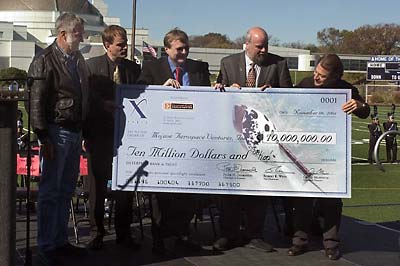Will government-sponsored space prizes fly?by Douglas O. Jobes
|
| Efforts to pass government-sponsored monetary incentives for private space development have an abysmal track record in Congress. |
Unlike the privately funded X Prize, the Space and Aeronautics Prize relies primarily on taxpayer dollars for funding. Even NASA’s Centennial Challenges prize program, while technically “government-sponsored,” derives its funding from the existing NASA budget. Some types of prizes, like the Space Settlement Initiative proposed by Alan Wasser, would cost the taxpayer nothing because incentives readily available in space (such as land claim recognition on the Moon) act as the financial lure for private space development efforts. Since a government-sponsored cash prize must tap the public coffer one way or another, though, monetary prizes are a much more difficult sell in Congress.
Efforts to pass government-sponsored monetary incentives for private space development have an abysmal track record in Congress. During the 1990’s, for example, a series of bills were introduced by Congressman Bob Walker (then chairman of the House Science Committee) designed to provide very substantial tax breaks for private sector “space corporations” as well as for investors who purchased stock in such companies.
The first, the “Space Transportation Services Purchase Act” of 1993 (also known as the Omnibus Space Commercialization Act), included a substantial section providing significant tax deductions for space businesses and investors. This bill died at the end of the 103rd Congress in December 1994 due to inaction by the House. The tax incentives section of that bill was reintroduced by Walker in June 1995 as the “Space Business Incentives Act”. This version of the legislation died in the House Ways and Means Committee at the end of the 104th Congress. Then, in 1996, a subsequent bill by Walker, the “Space Commercialization Promotion Act,” achieved approval by the House, but then died after being sent to the Senate for consideration.
Compared to the 1990’s, the financial picture today is much grimmer. Now the country is at war and we have a record budget deficit and mounting national debt. How will most Congressmen and Senators feel about setting aside $100 million for a space prize when there does not seem to be enough money to simply balance the budget?
| How will most Congressmen and Senators feel about setting aside $100 million for a space prize when there does not seem to be enough money to simply balance the budget? |
In Recommendation 5-2 of their June 2004 report, the Aldridge Commission implored Congress to authorize the funding of large cash prizes for private achievements in space: to establish “significant monetary prizes for the accomplishment of space missions and/or technology developments.” Whether such government-sponsored contests come to pass, however, is more a matter for you and I, as constituents, to decide. Without grassroots commitment to the concept of government-sponsored space prizes, the Space and Aeronautics Prize Act (and future proposals like it) will die in committee just like the tax incentive bills of the 1990’s.
Where to begin, then? First, everyone interested in seeing private space development happen should take the time to read and understand the Space and Aeronautics Prize Act. Then, of course, express your support of the legislation to your Congressman and Senators. This is surprisingly easy to do. The Space Settlement Institute’s website (www.space-settlement-institute.org) includes a Write to Congress link where anyone can locate the email address and mailing address of their representatives in Congress and quickly fire off an email or letter. The phone number for the U.S. Capitol switchboard is also provided on that page for those who want to call their representatives directly.
For the Space and Aeronautics Prize Act to stand a chance of becoming law, space advocates across the nation will need to stand up and loudly voice their support. Large numbers of citizens calling, writing, and emailing their Congressmen and Senators is the only way Congress will ever give this legislation serious consideration.
